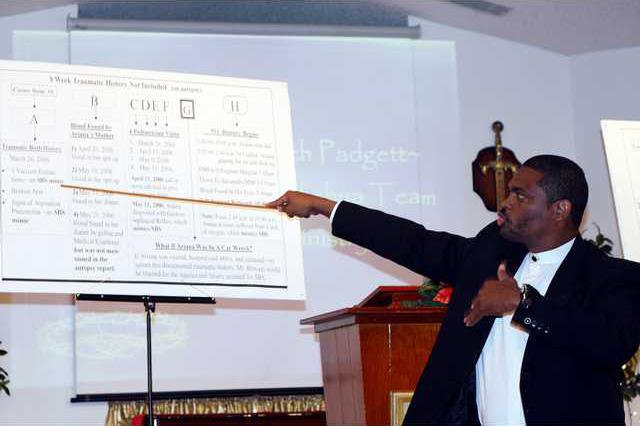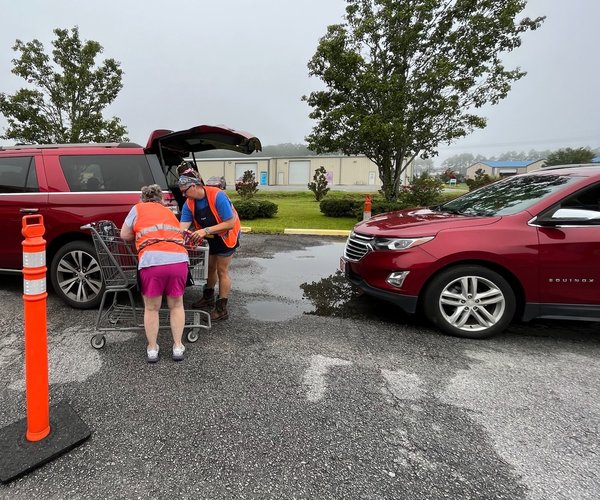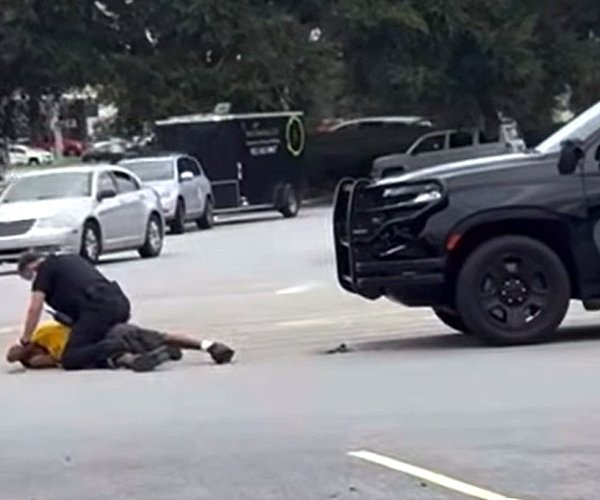Members of four local Christian and civil rights organizations convened at the Church of the Harvest on Saturday to rally support for an Effingham County resident who they believe was wrongfully indicted for killing his 8-week-old daughter in May 2006.
“This case is very important,” said Homer Wallace, president of the Effingham branch of the National Association for the Advancement of Colored People. “We feel like an injustice has been served, and we need to take a stand.”
After hearing Rincon resident Sammy Brinson’s story from William “Brother Emanuel” Padgett, founder of Yahshua Team Outreach and Ministry, president of the Savannah branch of the Southern Christian Leadership Council Carl Gilliard, Wallace and others with the local chapter of National Action Network joined forces with Pastor Gregory Brunson of the Church of the Harvest Ministries to gain the community’s support.
The groups plan to hold a press conference on the steps of the Effingham Courthouse in the next few weeks.
Background
It all began in the early morning hours of May 21, 2006, Brinson called 911 after his daughter woke up gasping for air and choking. Within moments, a Rincon police officer arrived at the Brinson home on Stephanie Avenue and immediately began performing CPR.
Baby Ariana was taken to Effingham Hospital by ambulance. About an hour and 40 minutes later, Lifestar airlifted the infant to Memorial University Medical Center, where doctors found fixed pupils and a bulging fontanel (soft spot) upon arrival.
A few hours later, they discovered retinal hemorrhaging, one of the three components of a triad of symptoms that some medical professionals believe alerts doctors to a diagnosis of shaken baby syndrome — a controversial syndrome that the medical community has widely debated in the past few decades.
Ariana died at 10:40 a.m. The next morning, medical examiner Dr. Suzanne Utley performed an autopsy at the Georgia Bureau of Investigations crime lab.
The following day (May 23), the Effingham County Department of Family and Children Services took custody of the Brinson’s other two children and placed them in foster care.
On May 31, 2006, police issued a warrant for Brinson’s arrest for the murder of his daughter, and on June 6, 2006, Brinson turned himself in and was placed in the Effingham County jail.
Judge John R. Turner issued a bail amount of $250,000 in a June 29 bond hearing. Brinson hired Savannah attorney Dwight Feemster of Duffy and Feemster, but he did not have the money to pay the bond.
On Sept. 18, 2006, a grand jury indicted Brinson for seven counts of murder and/or cruelty to children. He served 27 months before his wife Satrice Brinson was able to get him out of jail.
So far, there have been continuances on his case. There is a hearing scheduled for Dec. 29 and a tentative trial date is set for Jan. 10, 2009.
An injustice?
During Saturday’s event, Padgett laid out the case as he saw it.
By the time the autopsy report was completed and released on Aug. 29, 2006, indicating an official cause of death as craniocerebral trauma, DFCS had already taken Brinson’s two children from him (May 23). However, the judge did not sign the authorization to remove the children until May 24.
In addition, prior to the autopsy being released, the Ogeechee Judicial Circuit district attorney’s office had already held a bond hearing (June 29), and Brinson had served 84 days in jail.
Investigator Erick Riner with the district attorney’s office testified that “Dr. Utley … couldn’t tell me conclusively until she completes her report” what the cause of death was. But, he indicated that when he asked her if the injuries were consistent with shaken baby syndrome, “she said that they were.”
“Common sense should tell you, that we don’t have a crime if we don’t have a confirmed cause of death,” Padgett said.
Another injustice, according to Padgett and the other civil rights organizations in attendance, was the fact that based on information they obtained through the medical records of Memorial, the medical professionals did not take into account the baby’s traumatic delivery and full eight-week medical history.
“They failed to do a complete eight-week medical history,” Padgett said. “They didn’t have to do eight years of history or eight months, just eight weeks.”
There are two histories in this case, he said. Ariana’s full, eight-week medical history and the day of the incident — the only history, he said, the medical professionals reviewed in determining the cause of death.
According to the death summary dictated by Dr. Yamily Valdez and co-signed by Dr. Marty B. Scott, Ariana’s birth at Candler Hospital was “uneventful.” However, the birth medical records show otherwise.
The delivering physician had made three vacuum extraction attempts during delivery and the child was born with a broken shoulder and an imaging report revealed that she had “mild opacification of both lungs. This may represent aspiration pneumonia.”
In May 1998, the U.S. Food and Drug Administration issued a public health advisory on the “need for caution when using vacuum assisted delivery devices.” The FDA said vacuum assisted delivery devices may cause serious or fatal complications.
Another “differential diagnosis” not considered, according to Padgett, was Ariana’s history with gastroesophageal reflux and how the mother found spots of blood in the baby’s spit up and diaper — all indicated in the medical records that the defense attorney had requested.
According to an email to Brinson from his attorney, St. Josephs/Candler reported that no one else had requested the medical history of Ariana’s birth.
Dr. Harold Buttram, who worked on over 100 SBS cases before retiring, said that knowing a patient’s medical history is important to determining a cause of death.
“(I)t should be a standard requirement for doctors to review all pertinent medical records before bringing charges of SBS, not just the birthing records but also the maternal prenatal records, and pediatric outpatient records, all of which are critically important in these cases,” he said. “However, in my experience it is seldom that this is done in a thorough, conscientious fashion.”
Brinson’s attorney sent copies of all of hospital records, pediatrician records, autopsy photos and report along with the police investigative summaries and incident reports to three independent professionals — a medical examiner, a biomechanical engineer and a pediatrician. All three said Ariana’s death was not caused by SBS.
However, a second opinion by the district attorney’s office supports Dr. Utley’s autopsy results.
In a four-page newsletter, Padgett tells Brinson’s story and quotes various medical studies. There are several Web sites dedicated to the families of those who have been wrongfully convicted of abusing and/or killing the child by shaking them to death, just as there are numerous Web sites that advocate stronger awareness campaigns to fight SBS.
In Ariana’s case, no bruises were found on her body, no broken bones (other than the one documented from her traumatic delivery) and no skull fractures.








